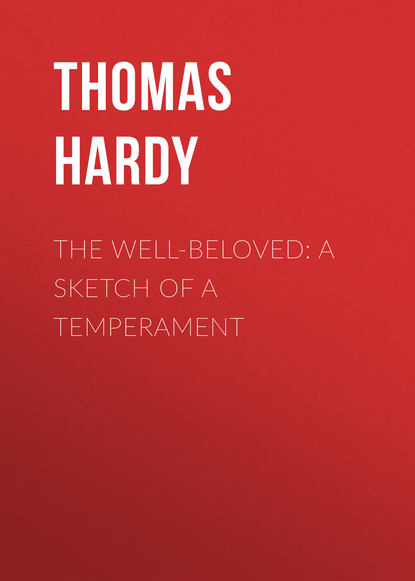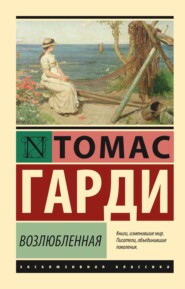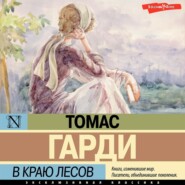По всем вопросам обращайтесь на: info@litportal.ru
(©) 2003-2025.
✖
The Well-Beloved: A Sketch of a Temperament
Настройки чтения
Размер шрифта
Высота строк
Поля
‘But if she’s dead and buried, you can go to her grave at any time as well as now, to keep up the sentiment.’
‘I don’t know that she’s buried.’
‘But to-morrow – the Academy night! Of all days why go then?’
‘I don’t care about the Academy.’
‘Pierston – you are our only inspired sculptor. You are our Praxiteles, or rather our Lysippus. You are almost the only man of this generation who has been able to mould and chisel forms living enough to draw the idle public away from the popular paintings into the usually deserted Lecture-room, and people who have seen your last pieces of stuff say there has been nothing like them since sixteen hundred and – since the sculptors ‘of the great race’ lived and died – whenever that was. Well, then, for the sake of others you ought not to rush off to that God-forgotten sea-rock just when you are wanted in town, all for a woman you last saw a hundred years ago.’
‘No – it was only nineteen and three quarters,’ replied his friend, with abstracted literalness. He went the next morning.
Since the days of his youth a railway had been constructed along the pebble bank, so that, except when the rails were washed away by the tides, which was rather often, the peninsula was quickly accessible. At two o’clock in the afternoon he was rattled along by this new means of locomotion, under the familiar monotonous line of bran-coloured stones, and he soon emerged from the station, which stood as a strange exotic among the black lerrets, the ruins of the washed-away village, and the white cubes of oolite, just come to view after burial through unreckonable geologic years.
In entering upon the pebble beach the train had passed close to the ruins of Henry the Eighth’s or Sandsfoot Castle, whither Avice was to have accompanied him on the night of his departure. Had she appeared the primitive betrothal, with its natural result, would probably have taken place; and, as no islander had ever been known to break that compact, she would have become his wife.
Ascending the steep incline to where the quarrymen were chipping just as they had formerly done, and within sound of the great stone saws, he looked southward towards the Beal.
The level line of the sea horizon rose above the surface of the isle, a ruffled patch in mid-distance as usual marking the Race, whence many a Lycidas had gone but had not been blest with a poet as a friend. Against the stretch of water, where a school of mackerel twinkled in the afternoon light, was defined, in addition to the distant lighthouse, a church with its tower, standing about a quarter of a mile off, near the edge of the cliff. The churchyard gravestones could be seen in profile against the same vast spread of watery babble and unrest.
‘Visiting the bottom of the monstrous world;’
Among the graves moved the form of a man clothed in a white sheet, which the wind blew and flapped coldly every now and then. Near him moved six men bearing a long box, and two or three persons in black followed. The coffin, with its twelve legs, crawled across the isle, while around and beneath it the flashing lights from the sea and the school of mackerel were reflected; a fishing-boat, far out in the Channel, being momentarily discernible under the coffin also.
The procession wandered round to a particular corner, and halted, and paused there a long while in the wind, the sea behind them, the surplice of the priest still blowing. Jocelyn stood with his hat off: he was present, though he was a quarter of a mile off; and he seemed to hear the words that were being said, though nothing but the wind was audible.
He instinctively knew that it was none other than Avice whom he was seeing interred; HIS Avice, as he now began presumptuously to call her. Presently the little group withdrew from before the sea-shine, and disappeared.
He felt himself unable to go further in that direction, and turning aside went aimlessly across the open land, visiting the various spots that he had formerly visited with her. But, as if tethered to the churchyard by a cord, he was still conscious of being at the end of a radius whose pivot was the grave of Avice Caro; and as the dusk thickened he closed upon his centre and entered the churchyard gate.
Not a soul was now within the precincts. The grave, newly shaped, was easily discoverable behind the church, and when the same young moon arose which he had observed the previous evening from his window in London he could see the yet fresh foot-marks of the mourners and bearers. The breeze had fallen to a calm with the setting of the sun: the lighthouse had opened its glaring eye, and, disinclined to leave a spot sublimed both by early association and present regret, he moved back to the church-wall, warm from the afternoon sun, and sat down upon a window-sill facing the grave.
IV. SHE THREATENS TO RESUME CORPOREAL SUBSTANCE
The lispings of the sea beneath the cliffs were all the sounds that reached him, for the quarries were silent now. How long he sat here lonely and thinking he did not know. Neither did he know, though he felt drowsy, whether inexpectant sadness – that gentle soporific – lulled him into a short sleep, so that he lost count of time and consciousness of incident. But during some minute or minutes he seemed to see Avice Caro herself, bending over and then withdrawing from her grave in the light of the moon.
She seemed not a year older, not a digit less slender, not a line more angular than when he had parted from her twenty years earlier, in the lane hard by. A renascent reasoning on the impossibility of such a phenomenon as this being more than a dream-fancy roused him with a start from his heaviness.
‘I must have been asleep,’ he said.
Yet she had seemed so real. Pierston however dismissed the strange impression, arguing that even if the information sent him of Avice’s death should be false – a thing incredible – that sweet friend of his youth, despite the transfiguring effects of moonlight, would not now look the same as she had appeared nineteen or twenty years ago. Were what he saw substantial flesh, it must have been some other person than Avice Caro.
Having satisfied his sentiment by coming to the graveside there was nothing more for him to do in the island, and he decided to return to London that night. But some time remaining still on his hands, Jocelyn by a natural instinct turned his feet in the direction of East Quarriers, the village of his birth and of hers. Passing the market-square he pursued the arm of road to ‘Sylvania Castle,’ a private mansion of comparatively modern date, in whose grounds stood the single plantation of trees of which the isle could boast. The cottages extended close to the walls of the enclosure, and one of the last of these dwellings had been Avice’s, in which, as it was her freehold, she possibly had died.
To reach it he passed the gates of ‘Sylvania,’ and observed above the lawn wall a board announcing that the house was to be let furnished. A few steps further revealed the cottage which with its quaint and massive stone features of two or three centuries’ antiquity, was capable even now of longer resistance to the rasp of Time than ordinary new erections. His attention was drawn to the window, still unblinded, though a lamp lit the room. He stepped back against the wall opposite, and gazed in.
At a table covered with a white cloth a young woman stood putting tea-things away into a corner-cupboard. She was in all respects the Avice he had lost, the girl he had seen in the churchyard and had fancied to be the illusion of a dream. And though there was this time no doubt about her reality, the isolation of her position in the silent house lent her a curiously startling aspect. Divining the explanation he waited for footsteps, and in a few moments a quarryman passed him on his journey home. Pierston inquired of the man concerning the spectacle.
‘O yes, sir; that’s poor Mrs. Caro’s only daughter, and it must be lonely for her there to-night, poor maid! Yes, good-now; she’s the very daps of her mother – that’s what everybody says.’
‘But how does she come to be so lonely?’
‘One of her brothers went to sea and was drowned, and t’other is in America.’
‘They were quarryowners at one time?’
The quarryman ‘pitched his nitch,’ and explained to the seeming stranger that there had been three families thereabouts in the stone trade, who had got much involved with each other in the last generation. They were the Bencombs, the Pierstons, and the Caros. The Bencombs strained their utmost to outlift the other two, and partially succeeded. They grew enormously rich, sold out, and disappeared altogether from the island which had been their making. The Pierstons kept a dogged middle course, throve without show or noise, and also retired in their turn. The Caros were pulled completely down in the competition with the other two, and when Widow Caro’s daughter married her cousin Jim Caro, he tried to regain for the family its original place in the three-cornered struggle. He took contracts at less than he could profit by, speculated more and more, till at last the crash came; he was sold up, went away, and later on came back to live in this little cottage, which was his wife’s by inheritance. There he remained till his death; and now his widow was gone. Hardships had helped on her end.
The quarryman proceeded on his way, and Pierston, deeply remorseful, knocked at the door of the minute freehold. The girl herself opened it, lamp in hand.
‘Avice!’ he said tenderly; ‘Avice Caro!’ even now unable to get over the strange feeling that he was twenty years younger, addressing Avice the forsaken.
‘Ann, sir,’ said she.
‘Ah, your name is not the same as your mother’s!’
‘My second name is. And my surname. Poor mother married her cousin.’
‘As everybody does here… Well, Ann or otherwise, you are Avice to me. And you have lost her now?’
‘I have, sir.’
She spoke in the very same sweet voice that he had listened to a score of years before, and bent eyes of the same familiar hazel inquiringly upon him.
‘I knew your mother at one time,’ he said; ‘and learning of her death and burial I took the liberty of calling upon you. You will forgive a stranger doing that?’
‘Yes,’ she said dispassionately, and glancing round the room: ‘This was mother’s own house, and now it is mine. I am sorry not to be in mourning on the night of her funeral, but I have just been to put some flowers on her grave, and I took it off afore going that the damp mid not spoil the crape. You see, she was bad a long time, and I have to be careful, and do washing and ironing for a living. She hurt her side with wringing up the large sheets she had to wash for the Castle folks here.’
‘I hope you won’t hurt yourself doing it, my dear.’
‘O no, that I sha’n’t! There’s Charl Woollat, and Sammy Scribben, and Ted Gibsey, and lots o’ young chaps; they’ll wring anything for me if they happen to come along. But I can hardly trust ‘em. Sam Scribben t’other day twisted a linen tablecloth into two pieces, for all the world as if it had been a pipe-light. They never know when to stop in their wringing.’
The voice truly was his Avice’s; but Avice the Second was clearly more matter-of-fact, unreflecting, less cultivated than her mother had been. This Avice would never recite poetry from any platform, local or other, with enthusiastic appreciation of its fire. There was a disappointment in his recognition of this; yet she touched him as few had done: he could not bear to go away. ‘How old are you?’ he asked.
‘Going in nineteen.’
It was about the age of her double, Avice the First, when he and she had strolled together over the cliffs during the engagement. But he was now forty, if a day. She before him was an uneducated laundress, and he was a sculptor and a Royal Academician, with a fortune and a reputation. Yet why was it an unpleasant sensation to him just then to recollect that he was two score?
He could find no further excuse for remaining, and having still half-an-hour to spare he went round by the road to the other or west side of the last-century ‘Sylvania Castle,’ and came to the furthest house out there on the cliff. It was his early home. Used in the summer as a lodging-house for visitors, it now stood empty and silent, the evening wind swaying the euonymus and tamarisk boughs in the front – the only evergreen shrubs that could weather the whipping salt gales which sped past the walls. Opposite the house, far out at sea, the familiar lightship winked from the sandbank, and all at once there came to him a wild wish – that, instead of having an artist’s reputation, he could be living here an illiterate and unknown man, wooing, and in a fair way of winning, the pretty laundress in the cottage hard by.
V. THE RESUMPTION TAKES PLACE
Having returned to London he mechanically resumed his customary life; but he was not really living there. The phantom of Avice, now grown to be warm flesh and blood, held his mind afar. He thought of nothing but the isle, and Avice the Second dwelling therein – inhaling its salt breath, stroked by its singing rains and by the haunted atmosphere of Roman Venus about and around the site of her perished temple there. The very defects in the country girl became charms as viewed from town.
Nothing now pleased him so much as to spend that portion of the afternoon which he devoted to out-door exercise, in haunting the purlieus of the wharves along the Thames, where the stone of his native rock was unshipped from the coasting-craft that had brought it thither. He would pass inside the great gates of these landing-places on the right or left bank, contemplate the white cubes and oblongs, imbibe their associations, call up the genius loci whence they came, and almost forget that he was in London.
One afternoon he was walking away from the mud-splashed entrance to one of the wharves, when his attention was drawn to a female form on the opposite side of the way, going towards the spot he had just left. She was somewhat small, slight, and graceful; her attire alone would have been enough to attract him, being simple and countrified to picturesqueness; but he was more than attracted by her strong resemblance to Avice Caro the younger – Ann Avice, as she had said she was called.
Before she had receded a hundred yards he felt certain that it was Avice indeed; and his unifying mood of the afternoon was now so intense that the lost and the found Avice seemed essentially the same person. Their external likeness to each other – probably owing to the cousinship between the elder and her husband – went far to nourish the fantasy. He hastily turned, and rediscovered the girl among the pedestrians. She kept on her way to the wharf, where, looking inquiringly around her for a few seconds, with the manner of one unaccustomed to the locality, she opened the gate and disappeared.

















